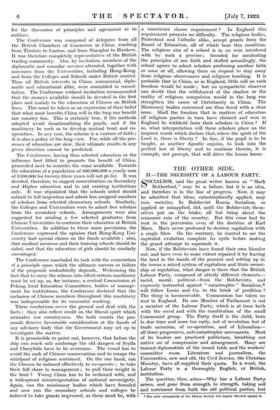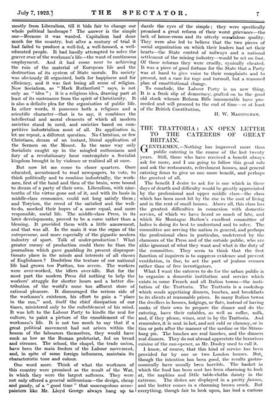THE OTHER SIDE.
II.-THE NECESSITY OF A LABOUR PARTY.
SOCIALISM, said the great writer known as "Mark Rutherford," may be a failure, but it is an idea, and therefore is in the line of progress. Now, it may be admitted that ideas, catastrophically applied, may ruin societies. In Bolshevist Russia Socialism, so applied or misapplied, did, until the Bolshevists them- selves put on the brake, all but bring about the economic ruin of the country. But this error had its root in the perversion even of the doctrine of Karl Marx. Marx never professed to destroy capitalism with a single blow. On the contrary, he wanted to see the capitalist evolution complete its cycle before making the grand attempt to supersede it.
Now, if the Bolshevists have found their own blunder out, and have even to some extent repaired it by leaving the land in the hands of the peasant and setting up in the towns a mixed system of capitalism and State owner- ship or regulation, what danger is there that the British Labour Party, composed of utterly different elements— racial, moral, political—from the Bolshevists, and expressly instructed against " catastrophic " Socialism,* will follow Lenin and Co. to the brink of perdition ? The thing is inconceivable. Communism has taken no root in England. Its one Member of Parliament is not a member of the Labour Party, which is at issue both with the creed and with the constitution of the small Communist group. The Party itself is the child, born in due time and none too early, not of revolution but of trade unionism, of co-operation, and of Liberalism— all three progressive, anti-catastrophic movements. Most of its leaders are practised politicians, breathing our native air of compromise and arrangement. Many are trained diplomatists of the round table and the workers' committee room. Literature and journalism, the Universities, new and old, the Civil Service, the Christian Ministry, have all supplied their quota. In a word, the Labour Party is a thoroughly English, or British, institution.
The question, then, arises—Why has a Labour Party arisen, and gone from strength to strength, taking soil and nutriment from both the old political parties, but
• The early propaganda of the Fabian Society was largely directed against it.
mostly from Liberalism, till it bids fair to change our whole political landscape ? The answer is the simple one—Because it was wanted. Capitalism had done much for the country, but after a century of trial it had failed to produce a well-fed, a well-housed, a well- educated people. It had hardly attempted to solve the graver crux of the workman's life—the want of continuous employment. And it had come near to achieving the ruin of the material of European life and the destruction of its system of State morals. Its society was obviously ill organized, both for happiness and for efficiency, and it was fast losing all sense of religion. Now Socialism, as "Mark Rutherford" says, is not only an " idea " ; it is a religious idea, drawing part at least of its sustenance from the spirit of Christianity. It is also a definite plea for the organization of public life. In other words, it possesses both a religious and a scientific character—that is to say, it combines the intellectual and moral elements of which all modern societies stand in need, and societies based on com- petitive industrialism most of all. Its application is, let me repeat, a different question. No Christian, or few Christians, dream of an instant, literal application of the Sermon on the Mount. In the same way only Socialists caught up in the mingled enthusiasm and fury of a revolutionary hour contemplate a Socialist kingdom brought in by violence or realized all at once.
But now let me come to closer quarters. Once educated, accustomed to read newspapers, to vote, to think politically and to combine industrially, the work- men, first of the hand and then of the brain, were bound to dream of a party of their own. Liberalism, with nine- tenths of the virtue gone out of it, and with its basis in middle-class economics, could not long satisfy them ; and Toryism, the creed of the satisfied and the well- to-do, mocked their hopes of a more equal, and more responsible, social life. The middle-class Press, in its later developments, proved to be a curse rather than a blessing. It provided them with a little amusement, and that was all. In the main it was the organ of the entrepreneur, and more especially of the gigantic modern industry of sport. Talk of under-production ! What greater enemy of production could there be than the journalism which gave gambling its present dispropor- tionate place in the minds and interests of all classes of Englishmen ? Doubtless the texture of our national life had grown too Puritan, too severe. The workers were over-worked, the idlers over-idle. But for the most part the modem Press did nothing to help the workers' struggle for shorter hours and a better dis- tribution of the world's none too affluent store of rational pleasure. It discouraged the serious side of the workman's existence, his effort to gain a "place in the sun," and, itself the chief dissipation of our times, ministered only to the enfeeblement of his mind. It was left to the Labour Party to kindle the zeal for culture, to paint a picture of the ennoblement of the workman's life. It is not too much to say that if a great political movement had not arisen within the bosom of the labourers themselves, they would have sunk as low as the Roman proletariat, fed on bread and circuses. The school, the chapel, the trade union, have been the main feeders of the Labour movement, and, in spite of some foreign influences, maintain its characteristic tone and colour.
One word more. Think of what the workmen of this country were promised as the result of the War, in which they were the largest sufferers. They were not only offered a general millennium—the design, cheap and gaudy, of a "good time" that unscrupulous scene- painters like Mr. Lloyd George always hang up to dazzle the eyes of the simple ; they were specifically promised a great reform of their worst grievance—the lack of house-room and its utterly scandalous quality. They were also led to believe that the two pieces of social organization on which their leaders had set their hearts—the State control of railways and a national settlement of the mining industry—would be set on foot. Of these reforms they were cruelly, cynically cheated. It was a piece of good fortune for the State that a Party was at hand to give voice to their complaints and to present, not a case for rage and turmoil, but a reasoned plan of constitutional change.
To conclude, the Labour Party is no new thing. It is a fresh slip of democracy, grafted on to the good old stock whence Reform Bills innumerable have pro- ceeded and will proceed to the end of time—or at least of the British Constitution.
II. W. MAssiNaimm.















































 Previous page
Previous page